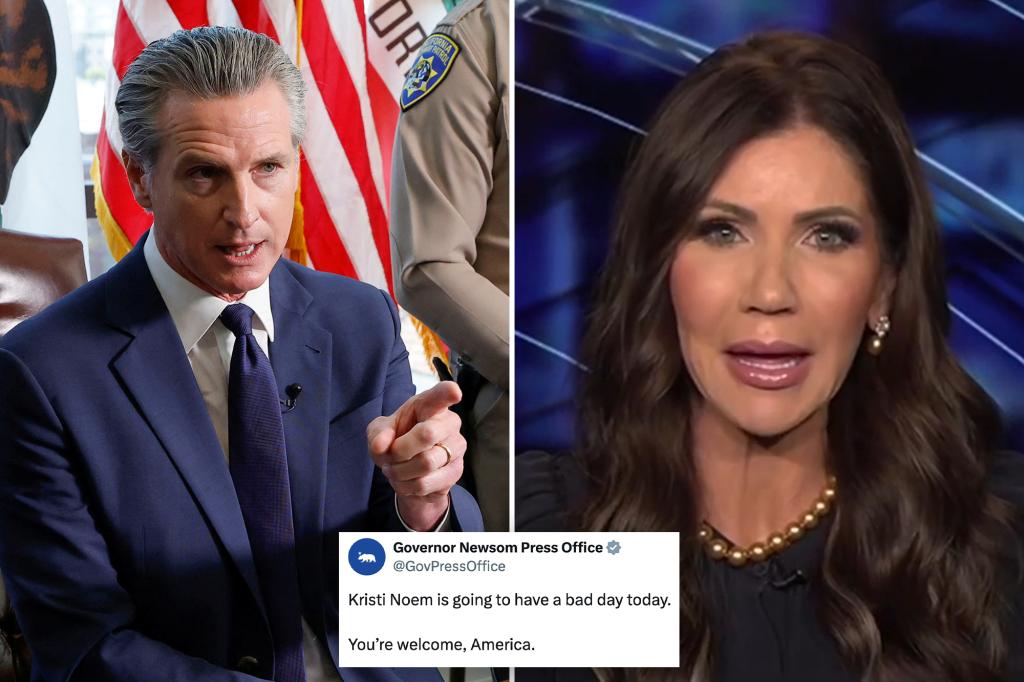Secretary Noem Responds to Governor Newsom’s Controversial Social Media Post
In a tense exchange that highlights the increasingly personal nature of political discourse in America, Department of Homeland Security Secretary Kristi Noem has publicly addressed what she describes as a “cryptic” and “menacing” social media message from California Governor Gavin Newsom’s office. The incident has raised serious concerns about the tone of political communication, especially in light of recent violence against public figures.
The post from Governor Newsom’s office stated: “Kristi Noem is going to have a bad day today. You’re welcome, America.” What might have been intended as political posturing had immediate real-world consequences according to Secretary Noem, who appeared visibly concerned during her interview on Fox News’ “Hannity” program. She explained that within minutes of the post appearing online, she began receiving anxious messages from family members, including her children, who feared for her safety. “It immediately panicked my family and friends,” Noem stated, noting that her loved ones are already aware of threats she has reportedly received from “cartels and criminals” since implementing the Trump administration’s immigration policies in her role at DHS.
The timing of this incident has proven particularly problematic, occurring in the aftermath of violence against political figures. Secretary Noem specifically referenced the death of Charlie Kirk in her comments, suggesting that the current political climate demands greater responsibility from public officials when communicating. “This is a day and age where we’ve always known that words matter, but there’s been real consequences that we have realized that have happened to incredible people like Charlie that we’ll have to live with forever,” she said during the interview. Her appeal for more measured discourse reflects growing concerns about the connection between inflammatory rhetoric and real-world violence.
The situation has escalated beyond a mere war of words, with U.S. Attorney for the Central District of California, Bill Essayli, referring the matter to the Secret Service for a “full threat assessment.” Essayli made his position clear in a statement posted to social media: “We have zero tolerance for direct or implicit threats against government officials.” This official intervention underscores the seriousness with which threats against public servants are now being treated, regardless of whether they come from ordinary citizens or other government officials. The involvement of federal law enforcement suggests a recognition that the boundaries of acceptable political speech may have been crossed.
What makes this exchange particularly noteworthy is that it involves two high-profile government officials from opposite ends of the political spectrum. Governor Newsom, a prominent Democrat from California, and Secretary Noem, a Republican serving in the Trump administration, represent the polarized nature of American politics. Their public disagreement illustrates how political differences have increasingly transformed into personal animosity, with social media serving as the battlefield where these conflicts play out before a national audience. The immediacy and public nature of platforms like X (formerly Twitter) mean that comments that might once have remained private now instantly reach millions, including family members who may fear for their loved ones’ safety.
In her closing remarks, Secretary Noem called for a return to “civil discourse” and an end to “ridiculous, irresponsible posts” like the one from Governor Newsom’s office. Her appeal highlights a growing recognition across the political spectrum that the current tone of public debate may be contributing to a dangerous environment. As threats against public officials continue to rise, there appears to be an emerging consensus that words do indeed have consequences, and that political leaders have a responsibility to consider how their rhetoric might be interpreted – not just by their supporters or opponents, but by those who might be motivated to take dangerous action. Whether this incident will lead to any meaningful change in how political figures communicate remains to be seen, but it serves as a stark reminder of the real human impact behind the political headlines.







